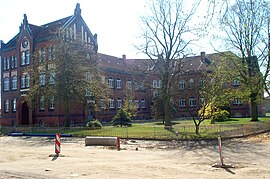Friedrich-Rohr-Gymnasium Grabow
| Friedrich Rohr Gymnasium | |
|---|---|
 View of the Friedrich-Rohr-Gymnasium |
|
| type of school | high school |
| founding | 1908 |
| address |
Prislicher Strasse 23 |
| place | Grabow |
| country | Mecklenburg-Western Pomerania |
| Country | Germany |
| Coordinates | 53 ° 16 '32 " N , 11 ° 34' 8" E |
| student | about 450 |
| Teachers | approx. 20 |
The Friedrich-Rohr-Gymnasium was a high school in the Mecklenburg town of Grabow .
It was founded in 1908 as a boys' bourgeois school . The construction of the school was co-financed by Friedrich Rohr and then named after him. Used as a hospital during the Second World War , it was converted back into a polytechnic high school in the following years . After the fall of the Wall in 1990, the school was given the status of a grammar school. Based on the number of pupils forecast by the state of Mecklenburg-Western Pomerania , the district decided in 2001 to close the school in 2005. Despite protests from the population, teachers and students and the use of supposedly incorrect statistical surveys, this decision could not be reversed and so the high school closed its doors on June 24, 2005.
Since the autumn of the same year, the building has been used as a regional school for grades 5–10, but under new management and with new teachers.
history
History from 2002
The school closed at the end of the 2002/2003 school year. Four teachers left the school and the 10th grade had to switch to the Goethe-Gymnasium (Ludwigslust) . Fifth grades did not follow, so that only grades 7-10 and 12-13 remained. In the following years the number of teachers was reduced to 15. In contrast, there were 130 students in grades 8, 9, 10 and 13.
The school year ended with an action week in which archives, which are now also stored in Ludwigslust , and teaching materials were cleared out. The last evening of the grammar school was "celebrated" with music and a large auction.
Building use after 2005
In the summer of 2005, the regional school previously located at Am Hufenweg moved to the empty building, which has since been called the Friedrich Rohr Regional School and in which grades 5–10 are taught. In addition to the administration, the teachers also changed and a renovation erased further traces of the former grammar school. The school building on Hufenweg has since been used as a primary school, which is called Eldekinder .
Educational offer
languages
Due to the small number of students and teachers, the range of foreign languages was always limited. In addition to English , which was taught from the 5th grade, students in the 7th grade could choose between Russian and French . The second foreign language had to be continued up to grade 11. In the secondary level were basic or advanced courses extremely rare in other languages than English.
music
In addition to mandatory music lessons, musical activities were also very popular after class. Pupils could get involved in the choir or the school band.
Sport and art
Even if the school's facilities for physical education were rather limited, teachers engaged in sports activities for students in their free time and offered various activities after class. So there was B. a volleyball club and a dance class for step aerobics and jazz dance. There were also committed teachers in the arts who organized a creative group. In addition, students were able to demonstrate their journalistic and creative skills in the creation of the Rohrlinger school newspaper .
Student exchange
Furthermore, a study trip lasting several days within Germany (e.g. Dresden ) was offered in the 10th grade and a study trip to Italy in the 11th grade . Alternative study trips, for example to England , were no longer offered in the later years.